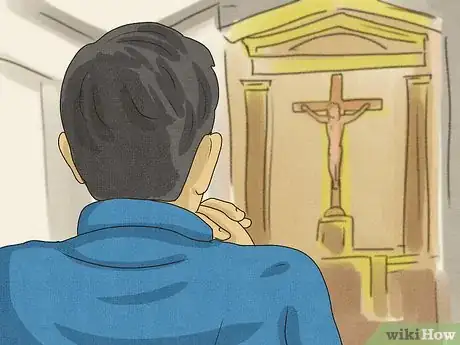wikiHow is a “wiki,” similar to Wikipedia, which means that many of our articles are co-written by multiple authors. To create this article, 22 people, some anonymous, worked to edit and improve it over time.
There are 8 references cited in this article, which can be found at the bottom of the page.
wikiHow marks an article as reader-approved once it receives enough positive feedback. This article received 13 testimonials and 91% of readers who voted found it helpful, earning it our reader-approved status.
This article has been viewed 335,148 times.
Learn more...
Whether you've just converted, you're just curious, or if it's just been a long time since your last confession, the process can be a little intimidating if you're not quite sure how it works. What do you do? What do you say? How rigid is the process? Relax! It's actually quite simple -- as we'll outline in the steps below!
Things You Should Know
- Visit your church during a designated confession time or call your priest to schedule a private confession.
- Enter the confessional and make the sign of the cross. Say, "Bless me, Father, for I have sinned. It has been [this long] since my last confession."
- Answer the priest's questions and confess your sins. Share your worst sins at the beginning of your confession.
- Complete the penance the priest suggests to demonstrate how repentant you are for your sins.
Steps
Getting Ready for Confession
-
1Examine your conscience. Since you're going to confession and all, you probably want to have an idea of what to say! Sitting back and reflecting on your actions is referred to as "an examination of conscience." So take a moment to call to mind your behavior since your last confession -- from the smallest to the largest of sins. If you wish to pray to the Holy Spirit during this time for guidance, you may. Don't know where to start? Here are a few questions you can ponder:[1]
- Have I disobeyed any of the commandments?
- Have I nourished my faith?
- Has anything else in my life influenced me more than God?
- Have I denied or doubted my faith?
- Have I hurt others, either accidentally or purposefully?
- Have I rejected any part of my faith?
- Have I been forgiving?
- What are the causes of my sins? What temptations do I surround myself with?
-
2Understand the difference between mortal and venial sin. Most of us commit venial sins on the regular; they're nothing to be ashamed of, though forgiveness should still be sought. These are your everyday sins -- lying to a friend to get out of a party, using God's name in vain, etc. Then there are the mortal sins, which are no laughing matter. Three conditions must be present in order for a sin to be mortal:[2]
- It must involve grave matter.
- You must understand what you're doing at the time you're doing it.
- You must have done it according to your own free will.
- Keep in mind that whatever it is, your priest will keep your secrets. Whatever it is, he will not (and cannot) pass judgment or let your secrets out. Even under threat of death! He can be trusted. You needn't worry about the consequences of telling him. In fact, neglecting to tell him is a sin in itself!
- Unfortunately many people think they could easily commit a mortal sin which makes them intimidated and thus leads to scrupulosity and eventually, OCD. This is a misconception. The good news is most sins are venial because many people don't understand what grave matter means in the criteria of mortal sins. Grave matter means the sin has to be severe. For example, grave matter includes murder, rape, selling illegal drugs or illegal drug abuse, adultery (a fancy term for "cheating" on your wife or husband), incest (To be married or have sexual intercourse with family, cousins, or relatives), theft of very expensive merchandise or stealing a huge portion of money, extreme hatred to your parents such as wishing them death. Venial sins are minor sins even if they were committed with knowledge and consent. This means you cannot commit a mortal sin if either the sin you committed was not grave even if you chose to do it anyway and with full knowledge, or if it did involve grave matter, but you were neither aware of what you were doing was a grave matter or you were forced to do it. No number of venial sins could ever become a mortal sin. Venial sins include petty theft (stealing something cheap), arguing with siblings, fighting someone for having a different opinion, speeding, etc. now just because you won't go to Hell, venial sins are to be avoided at all costs.
Advertisement -
3Find a confession session. This can either be done by dropping in or making a phone call; many churches have designated times for confessions. Though a priest can usually be found at most times with enough looking, going to a scheduled session is easiest. However, a quick phone call or brief meeting and you can schedule a private session as well.[3]
- If you're nervous to go into the church, don't be! Many churches have publicized when confession is -- either on a sign outside the church or as part of the church bulletin, which can almost always be found at the entrances. Some are even up online!
- Private sessions are a good idea if you have a lot to talk about. A normal confession may last 10 or so minutes. If you think yours will last a lot longer, feel free to ask for a private session.
-
4Pray that you may be honest and repentant. It's always a good idea to do a little prayer before confession to ensure that all goes well, nothing escapes your memory, and to ensure that your penitence is meaningful and true. You want to go in with nothing but the best of intentions.
- A large part of a good confession is meaning it, is seeking forgiveness, is putting your heart and soul into it. Even if you sat down with the priest and only muttered out an, "I hurt my friend" between sobs of regret, that'd be so much better than listing out every sin you've committed since your last confession between eye rolls. It's all about being true and faithful. The act of confession is about contrition -- wholly rejecting sin.
Talking to the Priest
-
1Enter the church and take your seat in a pew. You could go directly into the confessional (provided there's no one else in there or waiting outside), but sometimes it's nice to take a minute in the pew by yourself beforehand. You have this beautiful church probably almost all to yourself. Can you feel its energy resonating through you? Can you feel the majesty of the Lord's kingdom and how you're a part of it?
- Take a moment to kneel and pray with your head down and hands clasped together. Reflect on your faith and how you feel currently. Think about how you've been responding to God's call and how you've been living in the light of his love.
-
2Enter the confessional. When the priest is ready for you, of course. You'll probably see him there by his lonesome or someone else walk out just before you. Sit down either across from him or behind the screen -- it's totally up to you whether or not you prefer to remain anonymous. He won't treat you any differently either way.[4]
- Make the sign of the cross upon his prompt, saying, "Bless me, Father, for I have sinned. It has been (blank) since my last confession." This is your standard, traditional phrasing. However, if you just sit down and say hello, that's fine, too. The priest knows what he's doing.
- The Byzantine Rite is a bit different. The priest may sit to your side and put his epitrachelion on your head. He may then also do the Prayer of Absolution. But the idea remains the exact same -- just go wherever he takes you.[5]
- Make the sign of the cross upon his prompt, saying, "Bless me, Father, for I have sinned. It has been (blank) since my last confession." This is your standard, traditional phrasing. However, if you just sit down and say hello, that's fine, too. The priest knows what he's doing.
-
3Follow the priest's lead. Once you sit down and you've made the sign of the cross, just sit back and follow the priest's lead. He'll ask you how long it's been since your last confession (if you don't voluntarily offer that information), how you are feeling, maybe how your faith is going, and then ask you what sins you would like to talk about with him and God. It's just a casual conversation![6]
- Do not fret. There is absolutely zero pressure on your part. Again, as long as you come there with the intention of leaving with a clean heart, you're more than welcome in the church. There is no wrong way to go about confession!
-
4Confess your sins. This part is intimidating, but think about it this way: the priest you're talking to has probably heard just about everything before. Whatever you have to say will not blow his mind. So when he asks, start rattling them off, from the most serious to the least. If he asks any questions, answer them, but do not feel the need to go into detail. A simple, "I did so and so," will suffice.[7]
- Your priest is going to be very understanding. If you don't remember the exact timeframe, that's fine. If you don't remember your motivation, that's fine. All your priest cares about is that you're being as honest as possible and that your heart is in the right place.
-
5Listen as the priest offers counsel. He'll talk you through everything, possibly asking about your intentions, but mainly just letting you know that God loves you, sin and all. If he has any ideas to bring you closer to God, he may suggest them at this juncture. He's there to help, after all. He will then ask you to make an Act of Contrition. That goes like this:[8]
- My God, I am sorry for my sins with all my heart.
In choosing to do wrong and failing to do good,
I have sinned against You whom I should love
above all things. I firmly intend, with your help,
to do penance, to sin no more, and
to avoid whatever leads me to sin.
Our Savior Jesus Christ suffered and died for us.
In his name, my God, have mercy -
(If you are a Roman Catholic, your act of contrition will go like this:
- Oh my God, I am very sorry for having offended thee. I detest all of my sins because of thy just punishment. But most of all, because they offend you, my God, who is all good and deserving of all my love. I firmly resolve with the help of thy grace, to sin no more, and to avoid the near occasion of sin. Amen.
- My God, I am sorry for my sins with all my heart.
-
6Take heed as the priest will then offer absolution and recommend penance. Don't worry! It won't be anything huge. You may even walk away just having to say a few meaningful prayers. Take the absolution to heart -- you now have a brand new, clean slate to work with. It'll feel so uplifting![9]
- Just to clarify, "absolution" means your sins are washed away. "Penance" is your expression of regret and repentance, showing God that you're truly sorry for what you've done and that you wish for nothing more than to be forgiven.
Sealing the Deal
-
1Leave the confessional feeling a little lighter than before. The priest will give you a "Go in peace to love and serve the Lord," or something very similar. Smile, thank him, walk out, and be excited! Your sins have been forgiven and you have a clean slate to work with. You're that much closer to God. Can you feel it? Now what are you going to do with your fresh start?[10]
- If you forgot a sin you wished to mention, don't fret. God knows of your intentions and it has been forgiven along with the others. However, you may want to mention it next time. Or it could fester and turn into some unnecessary guilt!
-
2If you wish, return to your pew. Many often choose to return to their pew and resume prayer, offering a silent thanks to God. And if your penance was a select number of certain prayers, there's no better time than now to channel God. So feel free to return to your seat and bookend your reconciliation with prayer.[11]
- Many reflect on their experiences and how they can avoid the sins in the future. When's the next time you plan on confessing? What can you do in the meantime to find inspiration to live in His image? Harden your resolve now to try to live as He intended.
-
3Complete your penance. Whatever the priest suggested you do for penance is best completed as soon as possible. Whether that's in the pew or a conversation you need to have with a loved one, seek to fulfill His desires as soon as possible. You'll feel so relieved when all is said and done!
- Upon completion of your penance, you may want to take a moment to thank God and revel in your absolution. Think about how much God loves you and how wonderful it is to be a part of His glory. Not everyone is so lucky!
-
4Pledge to stay aligned with God. It is not expected that you never sin again. God knows that's ridiculous! It's only expected that you seek to avoid the situations that lead you to sin. It's also not wise to view confession as an excuse to sin! No, no, no. Confession is just a part of bringing humanity a bit closer to God, imperfections and all. All He wants is for you to do your best.
- As you go about the next days and weeks, keep in mind God's part in your life and how you can strive to live as He desires. Seek out the scriptures for inspiration, and surround yourself with those who yearn to live in similar ways. In other words? Go forth to love and serve the Lord. Your Lord.[12]
Rosary Prayer
Community Q&A
-
QuestionDuring confession, do you recite the Act of Contrition by heart or read from a prayer book?
 Community AnswerIf you know it by heart, that's great, but if you need to read from a prayer book, that's totally okay. The only thing that matters is that you mean the words you are saying.
Community AnswerIf you know it by heart, that's great, but if you need to read from a prayer book, that's totally okay. The only thing that matters is that you mean the words you are saying. -
QuestionCan I write down my sins and give them to the priest for confession?
 Harmoniejames1Community AnswerWrite them down if you're afraid you might forget them, but you have to say them out loud.
Harmoniejames1Community AnswerWrite them down if you're afraid you might forget them, but you have to say them out loud. -
QuestionHow do I confess a mortal sin?
 Community AnswerAs with any other confession, you will enter the confessional and kneel. Make the sign of the cross and the priest will tell you when to start confessing. When you actually confess, don't be scared or embarrassed. There is not a sin that the priest hasn't heard. Say (approximately) the number of times you have committed the mortal sin since your last confession.
Community AnswerAs with any other confession, you will enter the confessional and kneel. Make the sign of the cross and the priest will tell you when to start confessing. When you actually confess, don't be scared or embarrassed. There is not a sin that the priest hasn't heard. Say (approximately) the number of times you have committed the mortal sin since your last confession.
Warnings
- Remember if you lie to the priest, God will know you're not telling the truth. You can fool everyone including your pastor, but you can't fool God. He knows what you've done. Do not lie, be honest. Remember, no one likes to say uncomfortable things, but we need to let ourselves go from sin in order to properly move on.⧼thumbs_response⧽
- Repentance is required for your sin to be forgiven. This means you have to pledge you will stop doing what you have confessed. If you're not remorseful, God will know and he will not forgive you. Having repentance means to commit stopping what you sought to be forgiven and never look back at the sin again. If you sinned again, then you need to attend confession again and start over until you can finally put an end to the sin. If you have problems trying to stop, pray to God, talk to him while doing the penance and he will give you a hand. God doesn't abandon his children and never will.⧼thumbs_response⧽
- NEVER intentionally leave out a mortal sin. If you choose not to mention it, then your confession will be invalid and you will not be forgiven.⧼thumbs_response⧽
- If you die without confessing or repenting to any (even just one) mortal sins, you have committed Blasphemy against the Holy Spirit which is the only unforgivable sin. You will be damned for eternal life, which means you'll be sent directly to Hell. Today, it is not possible to commit this sin alive. God is willing to forgive you for any sin because he wants you to come to him because he loves you. Remember, he has made confession neither easy nor difficult, he wants you to not be honest to just him, but to yourself as well.
- If you die with a repented mortal sin but have never confessed, it doesn't mean you're necessarily going to Hell. God knows in your heart that you're truly sorry and could possibly consider sending you to Heaven. However, it is a lot easier if you simply go to confession.
⧼thumbs_response⧽
Things You'll Need
- The Rosary or chaplet (optional)
References
- ↑ http://www.catholictv.org/how-to-go-to-confession
- ↑ https://www.catholic.com/magazine/online-edition/mortal-and-venial-sin
- ↑ https://www.universitycatholic.net/resources/how-to-go-to-confession/
- ↑ http://www.ncregister.com/info/confession_guide_for_adults
- ↑ https://www.britannica.com/topic/Byzantine-rite
- ↑ http://www.kofc.org/en/resources/cis/devotionals/2075.pdf
- ↑ http://www.ncregister.com/info/confession_guide_for_adults
- ↑ https://www.catholic.org/prayers/prayer.php?p=43
- ↑ http://www.vatican.va/archive/ccc_css/archive/catechism/p2s2c2a4.htm
About This Article
When you go to confession, prepare by asking yourself if you have disobeyed any commandments, doubted your faith, or hurt others. Remember that the priest can’t disclose your secrets or pass judgement on you, so you can be totally honest with him. When you enter the confessional, make the sign of the cross as the priest prompts you to. You can remain anonymous if you wish, or identify yourself. Either way, the priest won’t treat you any differently. You should follow his lead in the conversation, but don’t worry about following a traditional format. Just think of confession is a casual conversation between you, the priest and God. For more tips on going to confession, like how to complete your penance and reflect on your session afterwards, keep reading!








































































